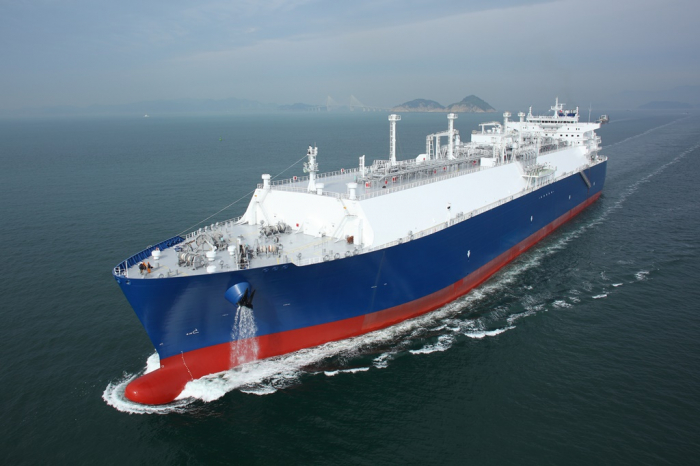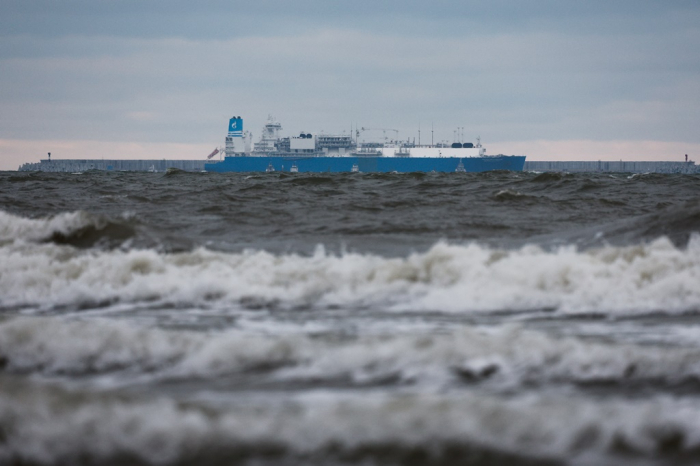War in Ukraine
Korean shipbuilders set for more orders on Ukraine crisis
Europe is expected to buy more LNG carriers as it seeks to diversify natural gas supply sources
By Feb 23, 2022 (Gmt+09:00)
3
Min read
Most Read
LG Chem to sell water filter business to Glenwood PE for $692 million


Kyobo Life poised to buy Japan’s SBI Group-owned savings bank


KT&G eyes overseas M&A after rejecting activist fund's offer


StockX in merger talks with Naver’s online reseller Kream


Mirae Asset to be named Korea Post’s core real estate fund operator



South Korea’s shipbuilders are expected to get more orders on the escalating crisis in Ukraine as Europe is diversifying natural gas suppliers to cut reliance on Russia for the energy resource. Stocks of the shipbuilders rallied on hopes of more deals.
Samsung Heavy Industries has secured a 998.5 billion won ($837.7 million) deal to build four liquefied natural gas carriers for a client in Africa, according to its filing to a financial regulator on Wednesday. This was the company’s first ship contract this year.
With the order, South Korea’s top three shipbuilders – Hyundai Heavy Industries Group, Daewoo Shipbuilding & Marine Engineering Co. and Samsung – have so far this year secured contracts to build 17 LNG tankers, already reaching 26% of orders won in 2021 to manufacture 66 gas carriers.
EUROPE TO DEAL WITH RUSSIAN GAS DISRUPTION
The orders came as the conflict between Russia and Ukraine renewed from late last year, South Korean shipbuilding industry sources said.
The European Union relies on Russia for about 40% of the region’s natural gas needs. Most comes through pipelines such as Yamal-Europe, which crosses Belarus and Poland to Germany, Nord Stream 1, which goes directly to Germany via the Baltic Sea, and via Ukraine, according to Reuters.

The EU has begun finding alternative natural gas sources to deal with possible disruptions of Russian supplies. Russian gas flows to Europe have already been lower than usual for several months, media reported.
“The EU, the largest ship buyer, is more likely to raise waterborne gas supplies to cope with Russia’s weaponization of natural gas, although it is premature to make a conclusion,” said an industry source. “Orders for LNG carriers could increase structurally.”
INCREASING ORDERS
Global energy companies also increased LNG ship orders. QatarEnergy is raising its tally of LNG carrier newbuilding berths to 20 from 16 for this year as the Qatari state-run company plans to order total 170 LNG tankers by 2027, according to TradeWinds, a global shipping news outlet.
Malaysia’s state energy firm Petronas and US energy major ExxonMobil Corp. are seeking 14 and eight units, respectively.
“Demand for the replacement of aged LNG carriers has already improved the order environment. The Ukraine crisis fueled the LNG tanker market’s boom,” said a shipbuilding industry source in South Korea. “Orders for offshore plants that had been sluggish are likely to grow too.”
STOCKS RALLY
Such hopes powered stocks of South Korean shipbuilders on Wednesday. Hyundai Heavy Industries Co. and Samsung jumped 7.35% and 6.65%, respectively, while Daewoo soared 21.9%. The country’s main Kospi gained 0.47%.
The industry still sees risks of cancellations of orders secured from Russia if the US and its allies impose fresh sanctions against Moscow.
South Korea’s three largest shipbuilders currently have order backlogs of seven LNG tankers from Russia, according to Samsung Securities Co.’s analysis. Last year, Samsung Heavy signed a $1.7 billion contract to supply shuttle tanker equipment to Russia.
But those were insignificant, given the top three makers’ total backlog of 150 LNG carriers as of end-January, sources said.
“The impact of the cyclical improvement stemming from the EU’s policy shift is expected to overwhelm the short-term risks,” said one of the sources.
Write to Jung-hwan Hwang at jung@hankyung.com
Jongwoo Cheon edited this article.
More to Read
-
 War in UkraineKorean firms on high alert as Russia invades Ukraine
War in UkraineKorean firms on high alert as Russia invades UkraineFeb 24, 2022 (Gmt+09:00)
3 Min read -

-
 Business & PoliticsPerfect storm from Ukraine crisis clouds Korea Inc.’s outlook
Business & PoliticsPerfect storm from Ukraine crisis clouds Korea Inc.’s outlookFeb 25, 2022 (Gmt+09:00)
4 Min read -
 Shipping & ShipbuildingHyundai, Daewoo race for ship orders after merger fails
Shipping & ShipbuildingHyundai, Daewoo race for ship orders after merger failsFeb 04, 2022 (Gmt+09:00)
2 Min read -
 Shipping & ShipbuildingKSOE bags $1.4 billion ship orders in first 2022 deals
Shipping & ShipbuildingKSOE bags $1.4 billion ship orders in first 2022 dealsJan 04, 2022 (Gmt+09:00)
1 Min read
Comment 0
LOG IN


